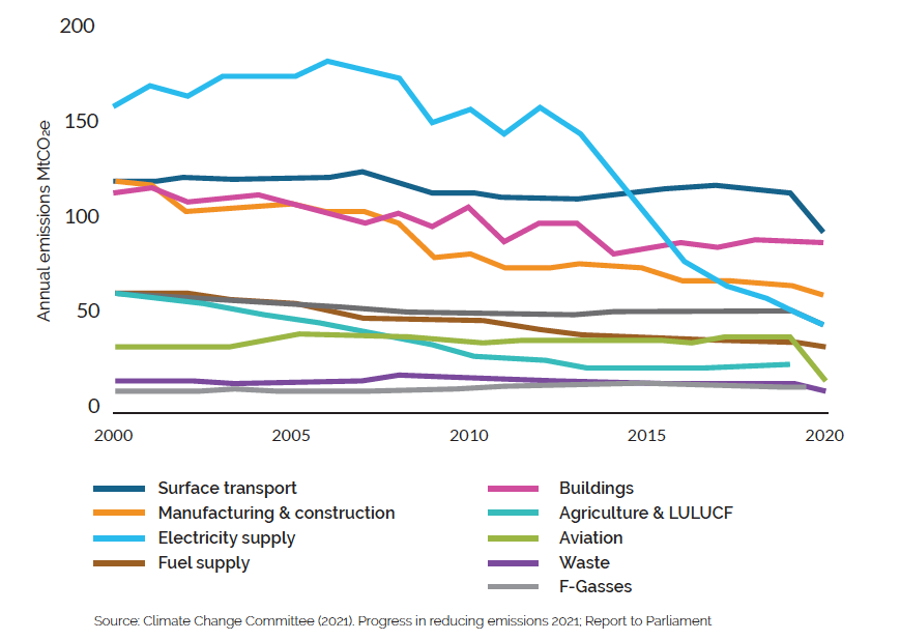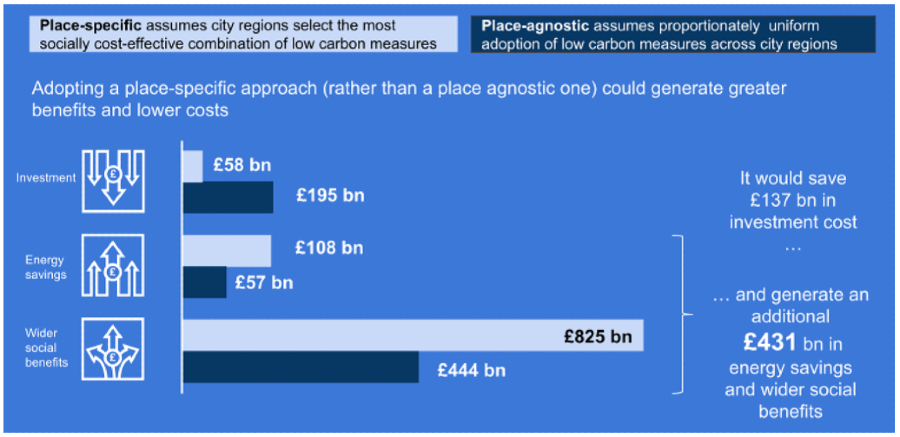In the context of climate change it has long been clear that we need to reduce our dependence on fossil fuels; recent events have only emphasised this.
But our deeply-entrenched reliance on fossil fuels for heating and mobility is one reason why the UK’s trajectory towards net zero remains insecure and uncertain. This is despite COP26 and the raft of net zero strategies published last year.
We’ve done well at replacing coal power with renewables but, discounting any temporary pandemic effect, progress on transport and heating has recently flatlined, as this graph from the Climate Change Committee shows.

A line chart from the Climate Change Committee, showing annual UK carbon emissions from different sources, from the year 2000 to 2020. The units are in million tonnes of C02 equivalents. The graph shows that emissions from electricity supply have reduced by around two thirds over the past 15 years, while emissions from many other sources including buildings, surface transport and fuel supply have hardly reduced at all.
Creating an economy fit for the future
To create an economy that is stable, clean and fit for the future, we must get out of fossil fuels and their volatile markets. We must do this wherever we can, but it’s especially urgent when it comes to heating and mobility.
The good news is that we pretty much know what we need to do. The government’s net zero strategy sets that part out fairly well.
But we need new ways of getting it done in practice, because we are not delivering at the speed or scale needed. We will need effective coordination of:
- finance
- skills
- incentives
- public engagement
- implementation.
All built on a clear medium-term direction of travel.
But help is at hand. A new study sets out how we can take a big step forward on delivery and unlock progress on heat and transport, by taking a place-based approach.
Beyond smart local energy systems
UK Research and Innovation’s prospering from the energy revolution programme is delivered by Innovate UK. It has brought together 180 organisations and £200 million of private and public funding to demonstrate the role and potential of smart local energy systems.
These systems are about how we can best use smart tech to join up all the supply, demand and storage in an area to create efficiencies and benefit residents. Early findings from the projects are very encouraging.
But at a macro level there has been a missing piece of the puzzle. A proper economic analysis of how different approaches to delivering low-carbon projects can create different benefits for society.
Organising optimal delivery
That’s why we commissioned PwC, with the University of Leeds and Otley Energy, to model the outcomes of different approaches and work out how best to organise optimal delivery.
Our aim was to:
- develop a new understanding of this
- build on existing government strategies to accelerate progress
- encourage new markets where innovative businesses can thrive.
The resulting report, accelerating net zero delivery: unlocking the benefits of climate action in UK city-regions, is very revealing.
Doing the right things
For the first time, this work models social and economic outcomes of decarbonising cities across the UK. It contrasts ‘place-agnostic’ approaches (which attempt to do the same thing everywhere) with place-specific plans that tailor solutions for that city’s needs and resources.
Its results are striking: we need to invest less if we tailor solutions to places, and we reap almost double the benefit.
There is a stark contrast between the social benefits gained by delivering what is needed locally, and the outcomes from a national ‘one size fits all’ approach. Cities across the UK are very different, so perhaps we shouldn’t be surprised that they will thrive with different solutions.

A bar chart comparing two scenarios. One is place-specific, and assumes that city-regions select the most socially cost-effective combination of low-carbon measures, while the other is place-agnostic and assumes proportionately uniform adoption of low-carbon measures across city-regions
Doing things right
Our current approach needs adapting to deliver these benefits. A current ecosystem of piecemeal incentives, unclear accountabilities, gaps in skills, capability, and financing all combine to prevent cities from planning holistically and coordinating elements needed for the long term.
The new study proposes a re-alignment: a delivery framework that links up national policy with local delivery in a productive way.
This framework puts accountability where it’s most needed.
It allows portfolios of local projects to be coordinated nationally. It develops skills and capability in the right places and helps create joined-up city-scale projects of the right size for financing by infrastructure investors. And crucially, it sets up action on the whole system of these blockers so projects have a clear route to delivery.
Capturing the rewards
If our cities can both do the right things, and do things right, there are big prizes within reach.
We can remove blockers to roll-out of novel net zero projects. We can build certainty about how we’ll get off fossil fuels and help create long-term stability for bill-payers. And we can bring in tens of billions of pounds of investment that will deliver jobs and growth in innovative businesses across the whole of the UK.
When it is hard to see the best route forward, the new insights in this report can point us towards a better net zero for us all.
Read the PwC report: accelerating net zero delivery: unlocking the benefits of climate action in UK city-regions
Top image: Credit: volody10, iStock via Getty Images




